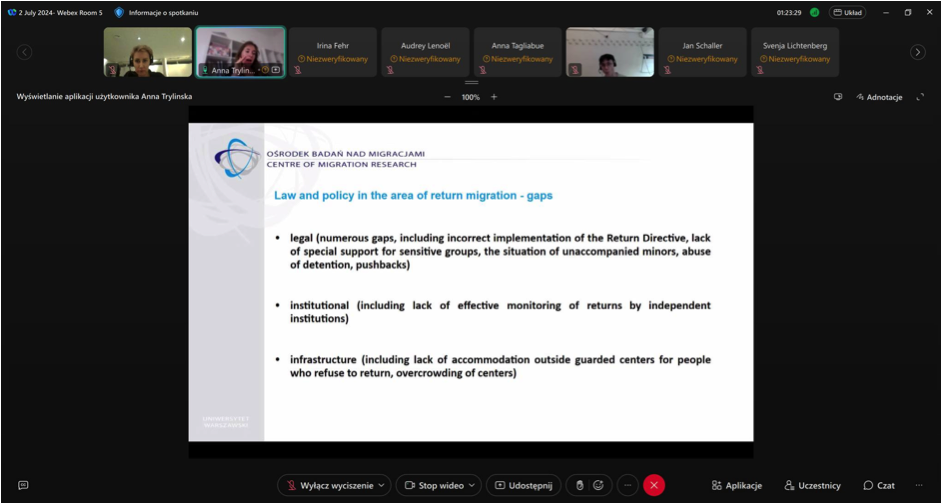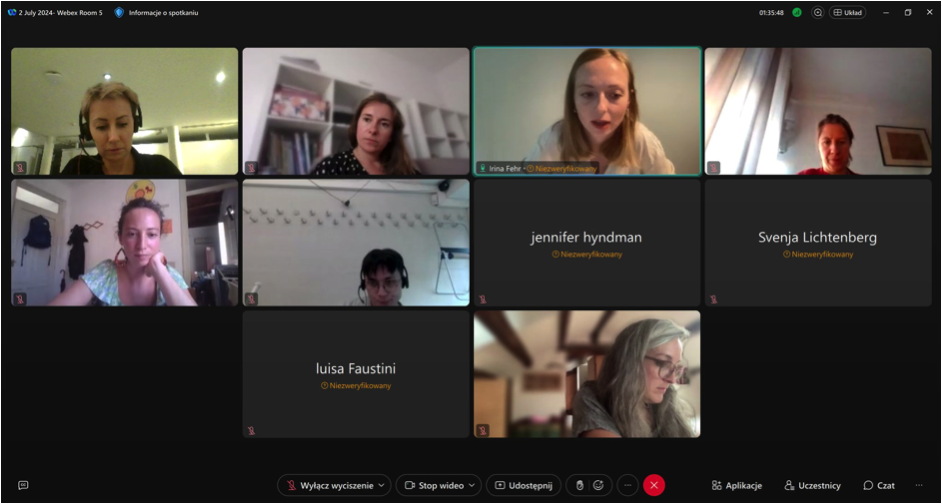Participation of Centre of Migration Research, University of Warsaw Team at the 21st IMISCOE Annual Conference on Various Migration Topics
Screenshot of session on Border control during which Anna Trylińska presented CMR UW team contribution and Q&A session by Marta Pachocka.
Mateusz Krępa, from CMR, Univeristy of Warsaw, Horizon Europe GAPs team partner, actively engaged in the media and press to discuss the recent developments regarding the Polish-Belarusian border and the functioning The Centre of Migration Research team of the University of Warsaw actively attended (onsite and online) the 21st IMISCOE Annual Conference “Migration as a Social Construction: A Reflexive Turn”, between 2 and 5 July 2024 hosted by the Centre for Research and Studies in Sociology of ISCTE (CIES-ISCTE) at the University Institute of Lisbon in Portugal.
Marta Pachocka chaired the online session on “Border control and return policies,” which included five paper presentations on specific cases from diverse geopolitical contexts, such as Europe, Africa, and the Middle East.
The presentations focused both on the results of legal and policy analysis and fieldwork. One of them was the contribution by Anna Trylińska on behalf of the CMR UW team (co-authored by Anna Trylińska, Tomasz Sieniow, Marta Pachocka, Mateusz Krepa) entitled “Changes in Polish Act on Foreigners: Efficiency of Return Procedures v. Protection of Migrant Rights?” based on the research results from Poland’s country report on “Legal and Policy Infrastructures of Returns in Poland” published earlier this year under Working Package 2.
As Anna emphasized, Poland's position on the Schengen Area's external border with three non-EU countries makes it crucial in implementing the EU return policy. However, as the last few years have shown, Poland is taking excessive measures in terms of changes to return law and its practice. In April 2023, the government introduced an amendment to the Act on Foreigners of 2013, which caused a more restrictive return policy. It can be seen as a continuation of the previous legal changes linked to the humanitarian crisis on the Polish-Belarusian border observed since mid-2021 and an attempt to deprive migrants of access to effective remedies. As a result, the full competence to conduct return proceedings was concentrated in the hands of the Border Guard, the period for filing an appeal against the return decision was shortened, and the suspensive effect of filing a complaint to the administrative court was lifted. The aim of the presentation was to examine how the recent changes in the national law would affect the protection of the rights of irregular migrants, recognition of the appeals and the influence on the willingness to comply with the decision of return. Legal and policy analysis provided during her presentation included, among others, the Act on Foreigners, samples of decisions issued by the competent bodies, the available court judgments regarding the return process, and return-related statistics. The presented results enabled a preliminary evaluation of the recent amendments' compliance with the 2008 EU Return Directive.
Another Screenshot of session on Border control during which Anna Trylińska presented CMR UW team contribution and Q&A session by Marta Pachocka.
In addition to this session, which specifically addressed return-related issues, Marta Pachocka attended three other sessions as a panelist or co-chair. These sessions tackling different aspects of migration, based on other research projects, focused on 1. “Engendering welcoming spaces for migrant emplacement and inclusive development in ‘left behind’ areas”, 2. “Migration Governance in Central and Eastern European Cities Post-2015”, and 3. “More restrictive, liberal, selective - or just multidimensional? European country responses to the reception, settlement and integration of displaced persons from Ukraine”.
Marta Pachocka was also for the first time among the jury members of the Rinus Penninx Best Paper Award this year. This Award was established in 2014 and is chaired by retired IMISCOE coordinator Rinus Penninx to celebrate every year the best paper submitted to and presented at the IMISCOE Annual conference following a rigorous review process. This year's edition jury included: Rinus Penninx (Chair), Anja Van Heelsum, Blanca Garcés-Mascareñas, Deniz Sert, Gianni D’Amato, Jens Schneider, Laura Oso, Marta Pachocka, Pedro Gois, Rene Kreichauf.
Finally, Marta Jaroszewicz, a new member of the HE GAPs team at CMR UW, attended the IMISCOE Conference. She co-organized the session-workshop entitled “Delineate forced migration research within the field of migration studies” and co-chaired the session on “(Forced) Migration in and from the Global East: decentring and decolonising knowledge production.”


